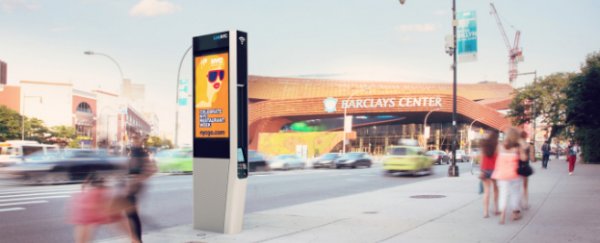An ambitious new project will see New York's old phone booths replaced with a network of public stations that provide free Wi-Fi that's more than 100 times faster than most hotspots, as well as free domestic phone calls. And they're projected to be up and running by the end of 2015.
The proposal, which is called LinkNYC, will be the largest free public Wi-Fi network in the world. Once fully rolled out, the city aims to have 10,000 of these stations across the five boroughs. The plan has been announced by the New York City government and a consortium called CityBridge.
So far there's not a huge amount of information out there on the technology that will be used in these booths, but some images have been released of what they'll look like. The website also claims that the hotspots will allow people to download a two-hour high-def moving in as little as 30 seconds - which is pretty damn impressive.
Importantly, the booths will contain a large screen for advertising, which is what will pay for the entire project. It's also estimated it will generate around $500 million revenue over the next 12 years.
The LinkNYC device also has a touchscreen tablet interface that allows people to access city services and directions, and it'll also offer an encrypted network connection.
However, as Ross Miller and Dan Seifert report for The Verge, it's not clear as yet how the machines will deliver gigabit speeds, when the Wi-Fi networks used commonly today don't support sustained gigabit connections from individual devices.
"The fact sheet for the company's plan doesn't detail what Wi-Fi standard will be used in the stations, or if Link plans to use a new technology that hasn't yet been deployed."
If they are planning on rolling out some new technology with the devices, it might not be compatible with the majority of smartphones. And what happens in five years if the way we all connect to the internet is suddenly revolutionised?
Still, despite the outstanding questions, it's an ambitious project that would finally see a major city embrace the need for public hotspots. And that's got to be a good thing.
Source: The Verge, TechCrunch
